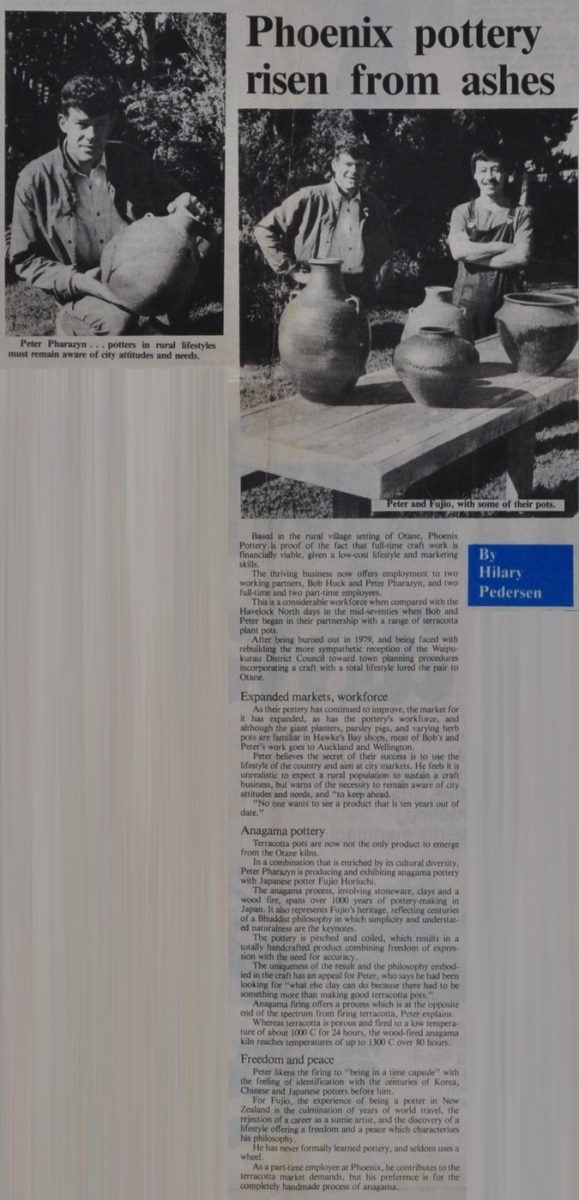Phoenix pottery risen from ashes
By Hilary Pedersen
Based in the rural village setting of Otane, Phoenix Pottery is proof of the fact that full-time craft work is financially viable, given a low-cost lifestyle and marketing skills.
The thriving business now offers employment to two working partners, Bob Huck and Peter Pharazyn, and two full-time and two part-time employees.
This is a considerable workforce when compared with the Havelock North days in the mid-seventies when Bob and Peter began in their partnership with a range of terracotta plant pots.
After being burned out in 1979, and being faced with rebuilding the more sympathetic reception of the Waipukurau District Council toward town planning procedures incorporating a craft with a total lifestyle lured the pair to Otane.
Expanded markets, workforce
As their pottery has continued to improve, the market for it has expanded, as has the pottery’s workforce, and although the giant planters, parsley pigs, and varying herb pots are familiar in Hawke’s Bay shops, most of Bob’s and Peter’s work goes to Auckland and Wellington.
Peter believes the secret of their success is to use the lifestyle of the country and aim at city markets. He feels it is unrealistic to expect a rural population to sustain a craft business, but warns of the necessity to remain aware of city attitudes and needs, and “to keep ahead.
“No one wants to see a product that is ten years out of date.”
Anagama pottery
Terracotta pots are now not the only product to emerge from the Otane kilns.
In a combination that is enriched by its cultural diversity, Peter Pharazyn is producing and exhibiting anagama pottery with Japanese potter Fujio Horiuchi.
The anagama process, involving stoneware, clays and a wood fire, spans over 1000 years of pottery-making in Japan. It also represents Fujio’s heritage, reflecting centuries of a Bhuddist [Buddhist] philosophy in which simplicity and understated naturalness are the keynotes.
The pottery is pinched and coiled, which results in a totally handcrafted product combining freedom of expression with the need for accuracy.
The uniqueness of the result and the philosophy embodied in the craft has an appeal for Peter, who says he had been looking for “what else clay can do because there had to be something more than making good terracotta pots.”
Anagama firing offers a process which is at the opposite end of the spectrum from firing terracotta, Peter explains.
Whereas terracotta is porous and fired to a low temperature of about 1000 C for 24 hours, the wood-fired anagama kiln reaches temperatures of up to 1300 C over 80 hours.
Freedom and peace
Peter likens the firing to “being in a time capsule” with the feeling of identification with the centuries of Korea, Chinese and Japanese potters before him.
For Fujio, the experience of being a potter in New Zealand is the culmination of years of world travel, the rejection of a career as a sumie artist, and the discovery of a lifestyle offering a freedom and a peace which characterises his philosophy.
He has never formally learned pottery, and seldom uses a wheel.
As a part-time employee at Phoenix, he contributes to the terracotta market demands, but his preference is for the completely handmade process of anagama.
Photo captions –
Peter and Fujio, with some of their pots.
Peter Pharazyn . . . potters in rural lifestyles must remain aware of city attitudes and needs.












Do you know something about this record?
Please note we cannot verify the accuracy of any information posted by the community.